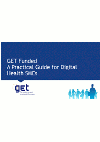 The EU funded GET project delivers four high-impact services to digital Health SMEs and entrepreneurs in order to boost their growth and move them to the next level of competitiveness. The Get Funded service is designed for SMEs looking for follow up funding (typically between 0.5-2M€) and provides them with training, resources and networking opportunities with investors at the European level. The Get Funded practical guide was written for them as a key resource mixing experts interviews, lessons learned from GET Funded event and a comprehensive investors' list.
The EU funded GET project delivers four high-impact services to digital Health SMEs and entrepreneurs in order to boost their growth and move them to the next level of competitiveness. The Get Funded service is designed for SMEs looking for follow up funding (typically between 0.5-2M€) and provides them with training, resources and networking opportunities with investors at the European level. The Get Funded practical guide was written for them as a key resource mixing experts interviews, lessons learned from GET Funded event and a comprehensive investors' list.
Download: GET Funded: A Practical Guide for Digital Health SMEs (.pdf, 1.709 KB).
Download from eHealthNews.eu: GET Funded: A Practical Guide for Digital Health SMEs (.pdf, 1.709 KB).
About GET project
The GET project delivers four high-impact services to eHealth SMEs and entrepreneurs in order to boost their growth and move them to the next level of competitiveness. Each life-transforming service has been designed to provide cross-border value to a different target group of companies. The project offers training, mentoring, market intelligence, support and, above all, quality contacts, through a range of events and repository.